Would you like to see an Urban Agriculture Collective farm at Booker T. Washington Park?
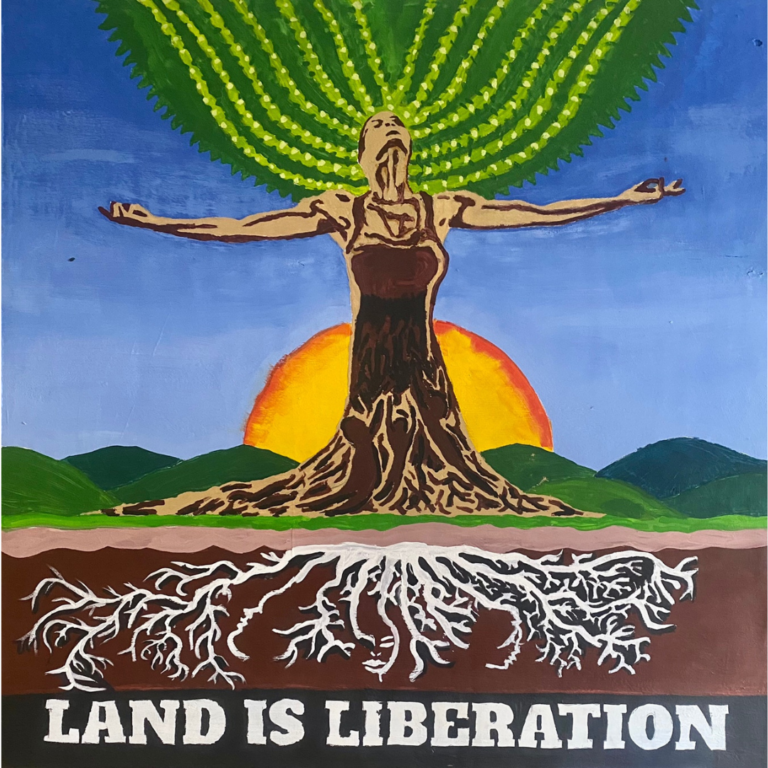
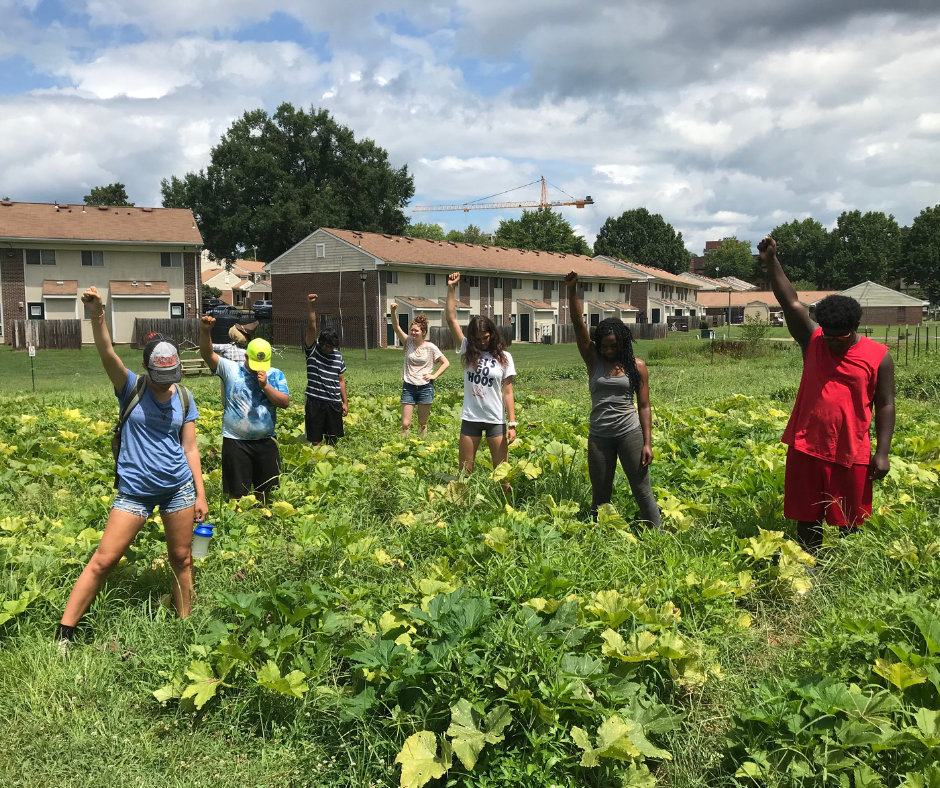
Urban Agriculture Collective (UAC) began as a resident-led community farm behind the Friendship Court apartments. UAC is now one of the programs of Cultivate Charlottesville, along with City Schoolyard Garden (CSG) and Food Justice Network (FJN).
Since 2007, UAC Farm has grown and shared up to 17,000 pounds of fresh organic produce annually. UAC has:
Residents supported the farm in different ways by:
In recent years, UAC began losing access to multiple farm plots, to necessary housing redevelopment. Without long-term access to urban land, thousands of pounds of food will be lost and hundreds of families affected.
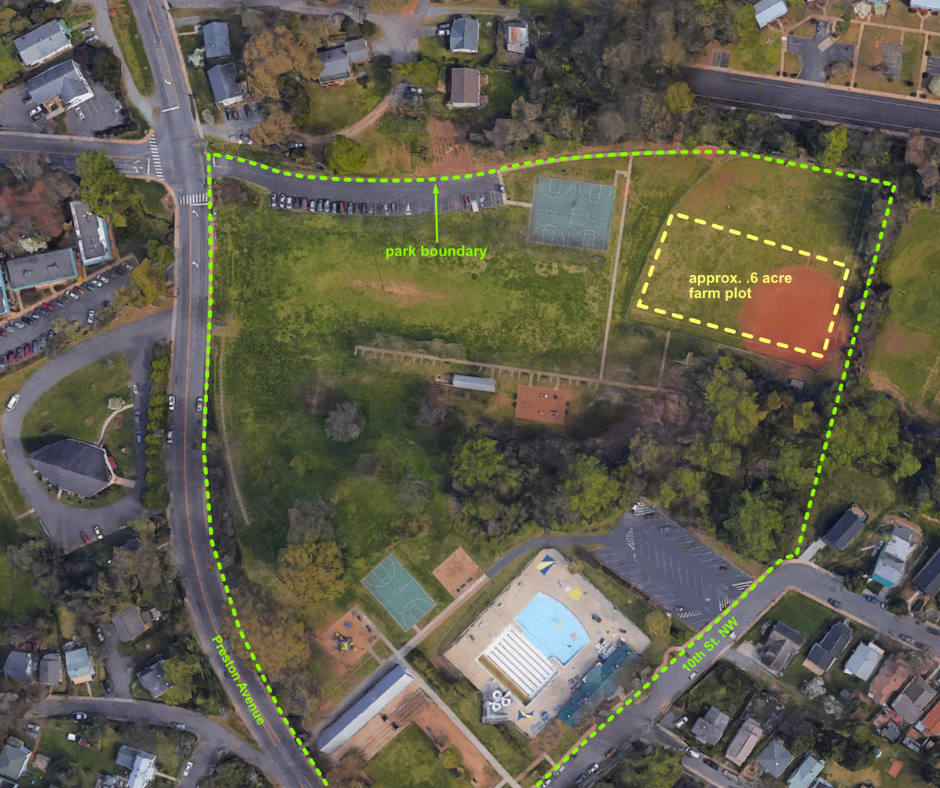
Learn more about the History of Booker T. Washington Park by reading our white paper HERE (excerpts below).
Central to Booker T. Washington Park’s history, the African American community played a key role in transforming the land from a history of injustice to a history of reclamation. As Black folks navigated the unjust system of segregation, the ‘Colored Recreation Board’ was established in early 1934, ushering in a wave of renovations and improvements to the park (From Private Privilege to Public Place, 1998).
For decades, Black Charlottesville residents played a key role in transforming the land from a history of injustice to a history of reclamation.
“The Barn,” for example, served a key role for the Black community, including a basketball gymnasium, music venue and meeting place (City as a Park, 98). Significant Park improvements were led by Black community leaders were accomplished “at a time when no more than five percent of these facilities were designated for Black use nation-wide.”
Civic and athletic groups such as the Garden Club, the “Colored Elks” and the “Colored Mothers Club” contributed to the improvements of the park. In 1944, the park hosted a Victory Garden Exhibit showcasing over 200 exhibits of flowers, vegetables, fruits and canned goods created by Black gardeners and farmers.
The Power to Grow is a community engagement, awareness, and policy action campaign in Charlottesville with a goal of securing public space for urban agriculture, primarily led by and for residents of color that have often been marginalized in city land use. The campaign will provide information about historical inequities in Charlottesville (specifically in regards to the Black experience & Black land loss), engage community in designing a vision for an urban garden in Booker T. Washington Park, and ask city council for an area of Booker T. Washington Park to be dedicated for community-based Urban Agriculture Collective site. . This campaign is designed to illuminate the issue of land access and ownership as the foundation for economic and social wellbeing, especially in regards to urban agriculture and the Black community of Charlottesville.
This year Urban Agriculture Collective (UAC), a grassroots effort started by residents of public and subsidized housing, will have lost all three foundational farm sites that provided no cost produce to neighbors of up to 17,000 pounds in one season. While UAC is finding ways and spaces to grow, they may not be permanent sites and are not as accessible to the neighbors experiencing food insecurity. Due to community advocacy in the city - the Charlottesville City Comprehensive plan prioritizes urban agriculture spaces in public areas. Charlottesville Parks & Recreation is gearing up to do a strategic plan and it is timely to have the community recommendation for a farm site at Booker T. Washington Park included in the plan. Now is the time for The Power to Grow!
Booker T. Washington Park has a long history in the Black community and it is one of the many spaces in Charlottesville that is being gentrified where Black neighbors no longer feel welcome. BTW Park holds powerful memories, was once the “Blacks Only” Park, a site of community advocacy, and hosted a horticultural fair with 200 Black grower exhibits. Community members want to restore this space to its legacy. The park is on the bus line and close to the 10th & Page, Westhaven, and Madison, neighborhoods where Urban Agriculture Collective works.
Charlottesville Parks & Recreation has a precedent for partnerships with local nonprofits managing city land. Piedmont Botanical Garden has a 40 year lease with the city to care for 11.5 acres at McIntire Park. (McIntire Park was the “Whites Only” Park during segregation.) Land recently purchased by the city adjacent to Azalea Park has been cared for by the International Rescue Committee New Roots Program and a lease agreement with New Roots is anticipated for that site as well. The YMCA is also a nonprofit operating on public land at McIntire Park.
Cultivate Charlottesville has been partnering with the City to grow gardens and farm sites since 2007 through the Urban Agriculture Collective and City Schoolyard Garden programs. These programs harvest around 10,000 pounds of fresh produce each year to share with community members facing food insecurity, at no cost. Cultivate also hosts youth experiential learning in the gardens and centers community leadership through community engagement cohorts of interns, apprentices, and advocates. The Power to Grow UAC Farm Site at Booker T. Washington Park will build on this sixteen year and trusted partnership.
Specific plans about site location in the park, site size, and site design will be determined in partnership with the Parks & Recreation Strategic Plan and will include significant community feedback. We anticipate being able to grow at least 5,000 pounds of produce on each quarter acre plot. The produce will continue to be shared at no cost community markets hosted in partnership with Charlottesville Redevelopment and Housing Authority and Piedmont Housing Alliance. Our previous farm site at Kindlewood reached from 300-500 families each year.
Cultivate brings significant resources and partnerships to test and if needed, remediate the soil; they will work with the city as well as organizations such as Piedmont Master Gardeners and private companies to make the soil healthy. Ensuring the viability of the land before any project implementation is a priority. In this way, The Power to Grow campaign aims to give the land a new life, following previous generations who celebrated and enjoyed the park.
Cultivate and partners at UVA Sustainable Food Coalition, UVA Global Studies, and Trinity Episcipal Church are in the process of doing an observational assessment of how the site is currently being used. Analysis of sports leagues and other potential uses will be conducted to ensure the best use of space across Charlottesville residents. Based on this study and additional research through the Parks & Rec strategic planning process a site will be chosen to ensure use for growing and community engagement for a greater percent of the time.
The City of Charlottesville has several contracts, agreements, and leases with partners that outline the use, care, and maintenance of public space. While each site has different guidelines, partners work with the city to ensure the land is managed with care and for sustainability. Cultivate anticipates being responsible for the majority of fundraising for site implementation.
Cultivate has experienced minimal vandalism in their urban agriculture sites from neighbors although groundhogs and other animals will sometimes have a field day in the smorgasbord of the gardens. Cultivate Charlottesville staff are skilled in how to deter pests and will apply lessons learned from other gardens. In the same way that the city cleared the invasive plants with goats to increase biodiversity, the garden will work to create a diverse ecosystem, using organic growing methods.
Yes, it is true that the UAC Community Markets are specifically for residents facing food insecurity, and the goal of The Power to Grow campaign is to bring back the dynamic community of neighbors that helped to build the park, during and after segregation. This, however, is not uncommon for public parks. Sports playing fields need to be reserved. Not everyone in the community plays or can afford to play golf. The YMCA is member only access. The IRC New Roots site focuses on refugee families. Use of a small section of Booker T. Washington Park for an Urban Agriculture Collective farm site falls in line with those uses, and in many ways brings equity to how space in Charlottesville is accessed. This is especially true with the pressures of development that are out of reach of many Charlottesville residents.
If you’d like to support an Urban Agriculture Site at Booker T. Washington Park you can: Sign the petition to show council your support; Donate to Cultivate and indicate Power to Grow in the subject line; Send an email to City Council expressing your support; or join Cultivate at their presentation to Council on Monday, September 18th during the 4:00pm meeting.
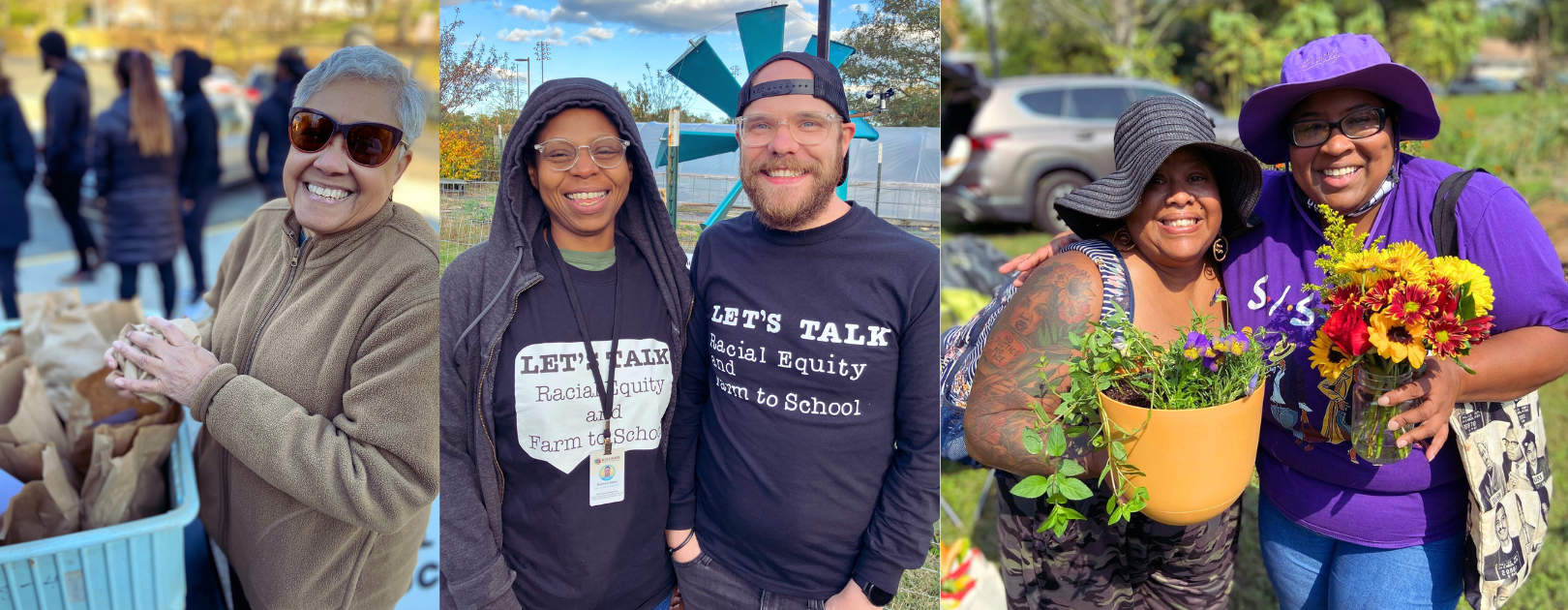
Digging Deep with Food Justice Network Large Group Gatherings
The Charlottesville community came together to ensure that food equity was included in themost recent revision of the Charlottesville Comprehensive Plan approved in November 2021. [Check out Chapter 7 HERE]
The community food equity recommendations included in the Comprehensive Plan came from the Food Equity Initiative Policy Platform – developed with input from over 300 individuals, 125 youth, and 10 city departments.
Together we advocated for strategic values, funding priorities, and concrete goals, policies and practices that City Departments and Charlottesville City Schools can implement to deepen their food equity capacity and work.
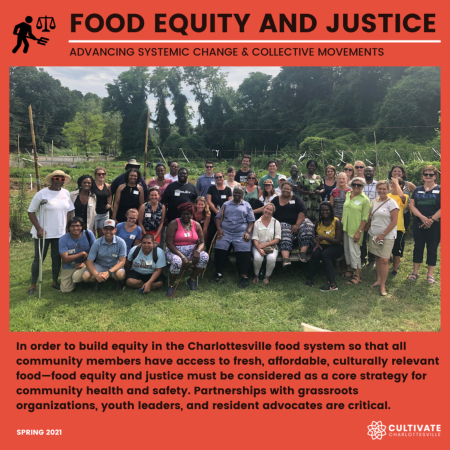
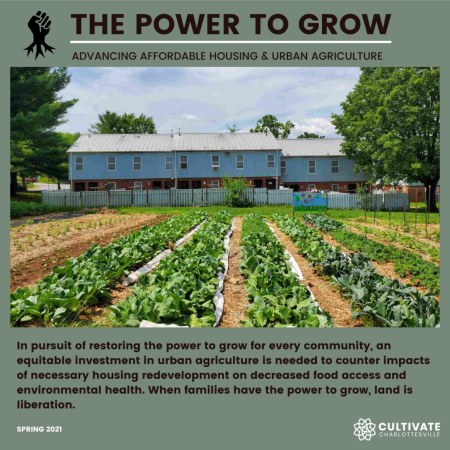
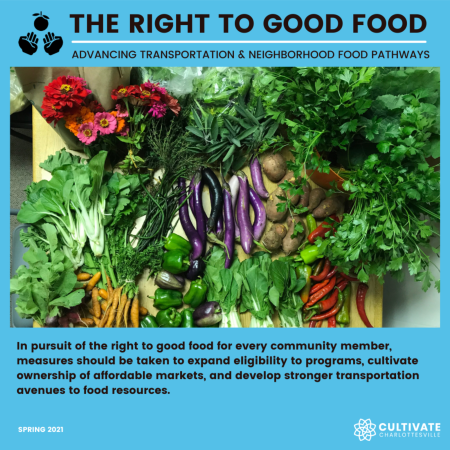
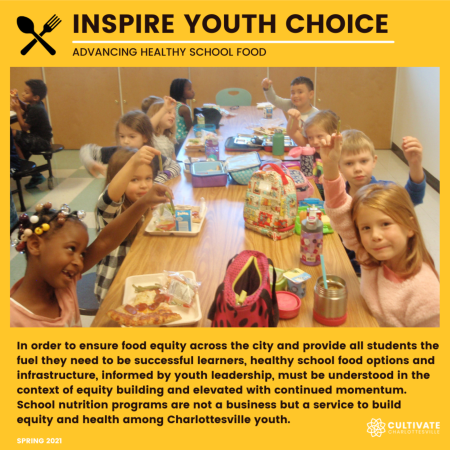
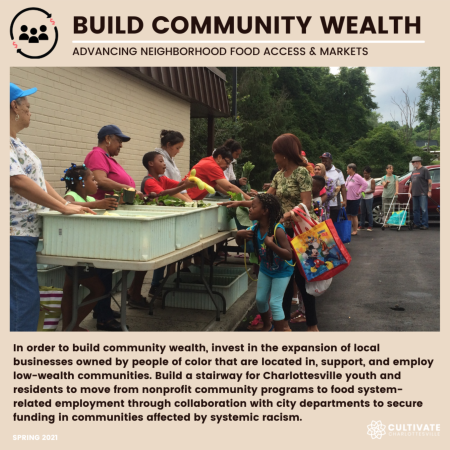
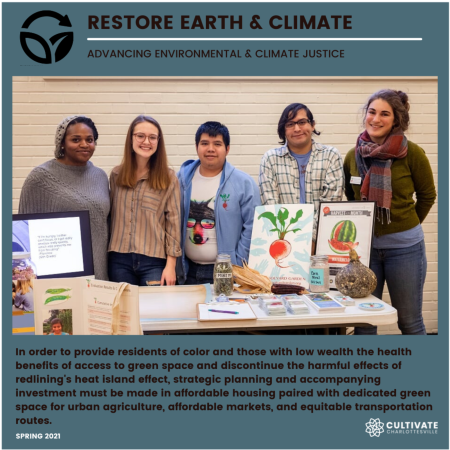
Read the full Food Equity Initiative Policy Platform here.
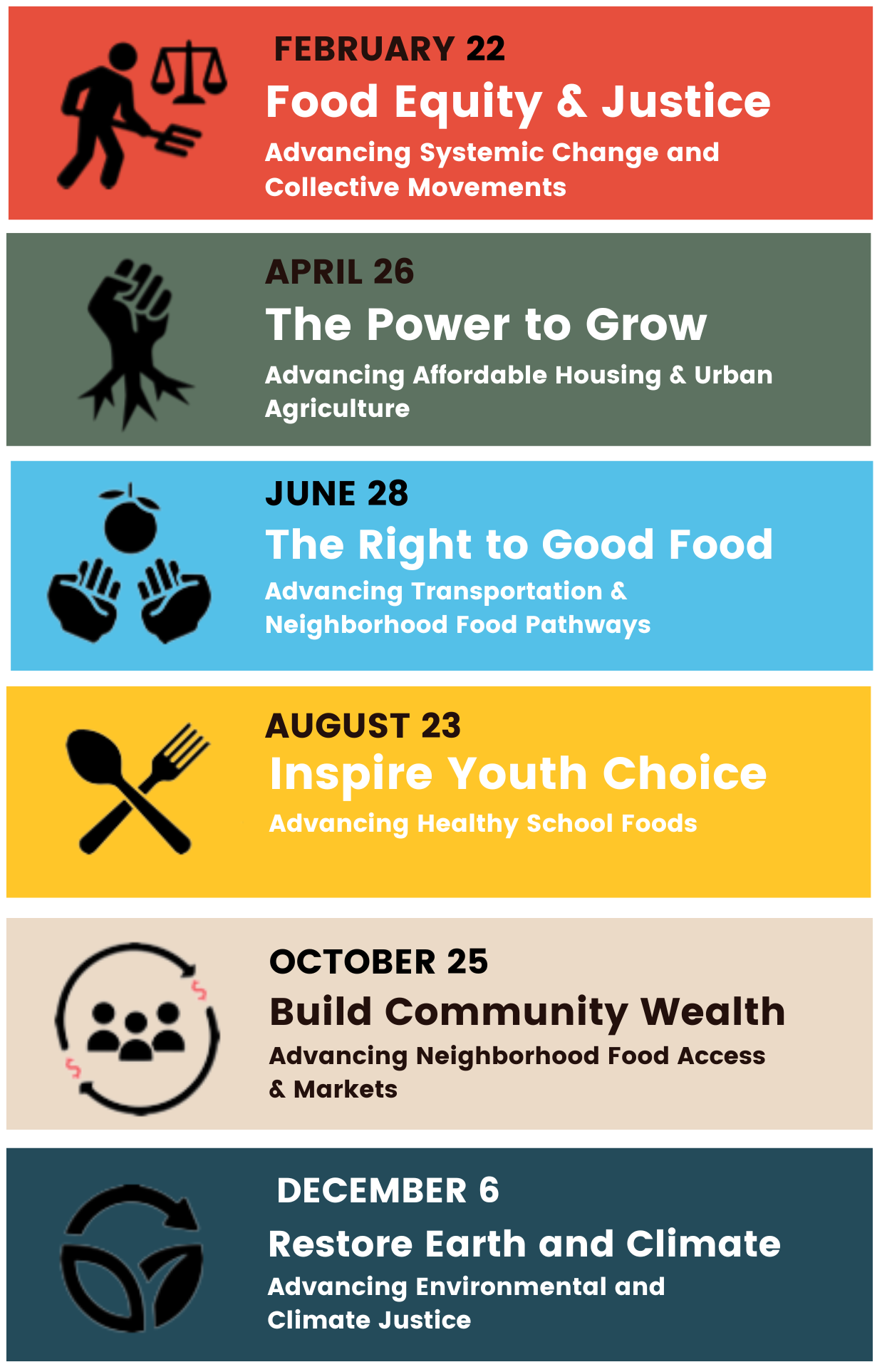
In 2023, the Food Justice Network large group gatherings are focused on exploring each plank of the Food Equity Imitative Policy Platform where we will explore and share our work aligns with each platform. Meetings topics are:
To learn more sign up for our monthly newsletters HERE. To join the FJN google group contact advocacy@cultivatecharlottesville.org
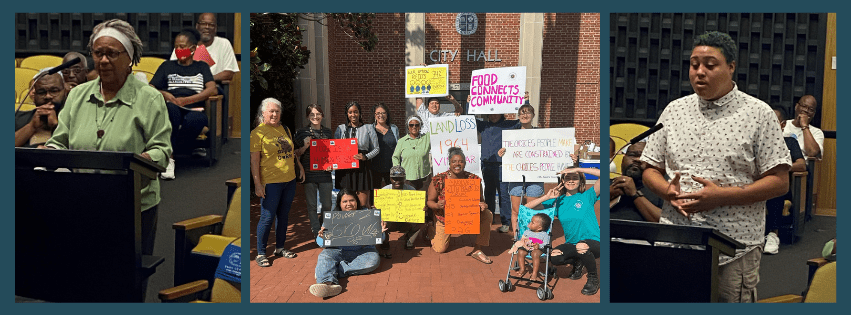
Ryan Thayer is excited to join Cultivate Charlottesville as Co-Executive Director. Born in Norfolk, Ryan grew up in the Bay Area as the 6th generation in his family to call San Francisco home. For nearly two decades, Ryan has worked to cultivate equitable and community-driven food systems that center supporting processes that engage community members to find their voice and step into their power. This time has shown him the importance of connecting with the Earth, and each other in community, as well as the power food can hold in healing deep systemic wounds. He believes building intentional communities in healthy relationships with the land is crucial to our collective well-being. He holds an Urban Studies and Planning degree from San Francisco State University and a Masters in Urban Affairs from the University of San Francisco. Outside of work, Ryan is a lover of anything basketball-related, traditional archery, live music, and wilderness living, and is slowly working on a speculative fiction novel. He lives in Charlottesville with his partner and two dogs.
Emma Brodeur first worked with Charlottesville City Schools by volunteering as a UVA Curry School of Education student at Albemarle High School and Burnley-Moran Elementary. While taking a break from her studies in 2012, Emma led backpacking trips with kids ages 8-17 in the Washington-Jefferson National Forest. She returned to UVA and transferred to the College of Arts and Sciences, where she completed her undergraduate degree in Spanish and Studio Art. Emma returned to City Schools through the Bridge Progressive Arts Initiative, teaching after-school art classes for 4th graders at Clark Elementary. Cultivate Charlottesville gave Emma the opportunity to unite her teaching experiences in the school garden. During her weekly classes at Clark Elementary and Johnson Elementary, she encourages students to explore the garden with confidence and kindness.
In partnership with community volunteers and community members, Cultivate Charlottesville builds food equity by growing and sharing fresh, organic produce with Charlottesville residents with limited financial resources.
Community Market Days are also a great place to reconnect with friends and neighbors, pick up some recipes, or watch a cooking demonstration.
CLICK HERE FOR 2024 COMMUNITY MARKET DAYS TIMES AND LOCATIONS!
Nik Lewis is the UAC Program Associate. Nik is of African American and Puerto Rican descent. He grew up in the Charlottesville area and came to urban farming as a way of centering himself and getting his hands in the soil. Working in the garden brings Nik fulfillment and joy. He enjoys giving back to and caring for Mother Nature. Above all, Nik creates a source of happiness and connection for the residents to whom we provide fresh and healthy produce.
email: nik@cultivatecharlottesville.org
Kellyn Kusyk grew up just outside of Charlottesville, where their mother turned their suburban backyard into a quasi-homestead, complete with vegetable gardens, a fruit orchard, ducks, chickens, geese, and indoor/outdoor pigs who learned to open all the kitchen cabinets and purposefully forgot their house-training when guests were over. Kellyn graduated from Charlottesville High School in 2016 and majored in Ethnicity, Race, & Migration while an undergraduate at Yale University, studying how systems of power are built and maintained along lines of race, class, gender, and sexuality in the United States. Also while in college, Kellyn was active in student organizing movements around endowment justice and unfair labor practices for professors in the Ethnicity, Race, and Migration department. After graduation, they were a woodworker, concrete laborer, line cook, and bartender, before eventually joining Cultivate Charlottesville in 2023. They are thrilled to bring their background in fabrication and homesteading to the food justice movement in Charlottesville. They are a conceptual sculptor, and live in the woods with their partner, one good dog (Trout), and one bad dog (Gogo).
Email: kellyn@cultivatecharlottesville.org
Trinity Hughes is a community organizer born and raised in Charlottesville VA. She has sparked local change in education that has ripped across the state of Virginia. She is passionate about connecting her community with resources. Some of her recent work has centered around mutual aid and curating spaces to heal. Trinity is also a huge advocate of uplifting those with lived experience to voice their concerns on how we can fight against racial inequities. Outside of work she loves to spend time with her dogs Prince & Skylar and family and friends. She is so excited to be a part of Cultivate Charlottesville and The Food Justice Network!
Sakeena Alkateeb joined Cultivate Charlottesville as the Grants, Evaluation, and Outreach Systems Director in 2024. She has worked in various roles in the nonprofit sector, including as a Philanthropy Manager and Equity Liaison at ReadyKids, a Development Consultant at CIMA Consulting, and a Project Manager and Grants Coordinator at the Central Virginia Farm Workers Initiative. Before working in philanthropy, Sakeena’s background lies in makeup artistry and community organizing. Her greatest passion and drive is fighting for racial equity and accessibility. She holds a B.A. in Sociology from the University of Virginia. Sakeena moved to the U.S. in 2009 and lives in Charlottesville with her partner and two cats.
Leah Leon is our long-time Garden Associate. As a Charlottesville native, Leah attended the city schools and found themselves in the Buford garden while attending middle school quite often. Leah became one of the first students to participate in the Garden Aid program the school had to offer and while at Buford, Leah developed a deeper appreciation for the environment and put their heart into maintaining the garden space while being a team player for their peers. Although they moved to the county during their high school career to attend Monticello High School, Leah has been loyal to the organization and became a youth intern for 2 (3?) years participating in various projects with other interns until officially taking the Garden Associate position. Although new to the title, they are very much familiar with how the organization works and excited to help support the organization and staff however they can. Leah is currently attending PVCC while taking an interest in biology and often likes to share a random fact or idea unprompted.
Email: leahleon@cultivatecharlottesville.org or volunteer@cultivatecharlottesville.org
Susan Adeeb bio coming
Email: susan@cultivatecharlottesville.org
In 2023 Cultivate Community Engagement Cohorts talked to hundreds of community members through door to door surveys, in depth listening circles, and a community roundtable. We asked, “Would you like to see an urban farm site at Booker T. Washington Park?” and “What would your vision for an Urban Agriculture Collective farm site at Booker T. Washington be?”.
Read “White Paper on Building a Healthy and Just Local Food System”
Our food system does not serve us all equally. The result of this inequality can be seen in the health inequities apparent across race and class. Food justice calls upon us to develop tools and frameworks to adequately address these race and class food related inequities.
Over the years FJN has collaborated with partners and community to develop reports that tell the story of community voice and our work. Check out these documents:
The Power to Grow is a community engagement, awareness, thought leadership, and policy action campaign with a goal of securing public space for urban agriculture, primarily led by and for BIPOC residents. The campaign will also educate the public about historical inequities in Charlottesville, explore community support for an Urban Agriculture Collective farm site in Booker T. Washington Park, and ask city council for an area of Booker T. Washington Park to be dedicated for community-based urban agriculture.
This campaign is designed to illuminate the issue of land access and ownership as the foundation for economic and social wellbeing, especially in regards to urban agriculture and the Charlottesville Black community. This project continues the work started by residents of public and subsidized housing in 2007 when they built a farm site at Friendship Court in order to grow and share food and power. The Power to Grow aims to secure long term leases for urban agriculture space in a historically Black Charlottesville Park. It also aims to advance racial equity by spreading awareness of Black land loss and gentrification in the city. These goals were articulated as a priority from residents in the 2019 Local Places events and the 2021 Food Equity Initiative Policy Platform.
Our intention of the Power to Grow Campaign is to engage the community to determine their wants and needs for a garden in Booker T. Washington Park and to effectively convey the community’s support for this project to council..
City of Promise is in the heart of the 10th & Page neighborhood and Westhaven Community with a mission to end generational poverty, and to foster a culture of achievement in which all children in our community graduate from high school, ready for college or career. Cultivate Charlottesville has been partnering since 2015 to host a garden at 908 Page Street to engage youth and community.
We believe that a pathway for leadership that activates spaces where community leaders can invest their power and wisdom towards systemic change is strongest when it is community centered, diverse, and inter-generational.
Why diverse and intergenerational?
Systemic inequity in our food system affects our community at every stage of life. We’ve found that working across generational lines simultaneously builds a deeper understanding of systemic injustice while cultivating new traditions honoring voice, power, and decision-making among our multicultural grassroots leadership group.
What is a community engagement cohort?
Community engagement is not just a one time event or festival. At Cultivate we aim to create and implement systems and practices that actively engage grassroots community members across the scope of Cultivate’s work. Launched when students in the Buford MIddle School Garden Aide Class said they wanted to continue to work in their school garden over the summer, we began building paid opportunities for youth and adults. These cohorts come together as teams, build food justice knowledge and capacity, and work across a specific time frame, with specific goals in mind.
Youth Food Justice Interns (high school students): City Schoolyard Garden program hosts an eight-week summer youth food justice program for up to twelve city students. Youth care for the schoolyard gardens, cultivate team building practices, and have two core capacity building units on food justice and healthy school meals.
Food Justice Apprentices (young adults around 18-24): Food Justice Apprentices are part of a cross-program cohort designed to build leadership opportunities for young adults who have come through the K-12 Cultivate initiatives while strengthening Cultivate’s effectiveness and community voice. The Food Justice Apprentices have three primary responsibilities including: supporting a specific program area of Cultivate’s work, advancing a cross-program advocacy campaign, and building capacity as a cohort of peer learners and leaders. The Food Justice Apprentices also support special projects across the organization as needed.
Food Justice Community Advocates (resident leaders -adults and elders): The Food Justice Community Advocates cohort aims to amplify community leadership and be a bridge with city leaders around critical issues of food equity and racial justice in Charlottesville. This paid six-month cohort has been focusing on The Power to Grow campaign and engaged over 300 residents in building a vision for urban agriculture in Charlottesville.
Food Equity Initiative Policy Platform
The Food Equity Initiative Policy Platform was developed with input from over 300 individuals, 125 youth, and 10 city departments.Through six core planks, the FEI Policy Platform outlines community recommendations for building a healthy and just food system including strategic values, funding priorities, and concrete goals, policies, ad practices for City Departments and partnering organizations to deepen their capacity for food equity.
Michele Gibson has returned to Cultivate after previously working as a Community Advocate as the Community Advocate Lead for our 2023 Cohort.
Amyah Limbacher was born and raised in Charlottesville, VA. She is a proud big sister to her younger siblings. She has been with Cultivate for four years, starting out as an intern in high school and now a Cultivate Apprentice working with the City Schoolyard Garden program. Her favorite part of the job is working with the youth and teaching kids about how gardening ties in with the food system. As a former CCS student, she loves seeing how things are changing and encourages students to use their voices. Having grown up in a single-parent home, she has seen food insecurity firsthand and wants to be a part of the change in our food landscape. She is thorough, passionate, and determined in her work. Amyah is also a first-generation college student working towards a business associate degree. She aspires to one day be an entrepreneur and a flower farmer.
Calista Barbour has been a part of Cultivate for four years on and off. She loves being outside in the garden, it helps her feel grounded. Being a part of Cultivate has helped stimulate her creativity and helps her to see the importance of food equity and abundance. Coming from a low-income family that was mostly dependent on government assistance, she knows what it feels like to be food insecure. It feels good to stand up for food justice. As a new mother, she feels more connected being able to have her daughter be a part of an organization that she has been with since middle school. She aspires to be is more bold, assertive, and driven in my day-to-day life. Calista also loves music and art.
Emmanuel Quezada-Romero (or Manny) has been working with Cultivate for several years. He moved from Mexico to Arizona to Virginia and has had a life full of experiences. At the age of 12, he started working with Cultivate as a student volunteer. He worked with Cultivate throughout his school career as a Garden Aide and a Food Justice Youth Intern and learned many things. In school he was in chess club and is a very fast learner. He is quick to adapt, a jack of all trades. Although he is not a master of all things, he is handy and has a lot of skills that he puts to good use in helping others. Manny believes that life is as fun or boring as you make it, whatever effort you put into it is what you will get back from it.
email: emmanuel@cultivatecharlottesville.org
KJ Howard has been with Cultivate for about 6 years, since 7th grade. He was a student intern, apprentice and most recently was hired on staff as FJN Associate. His love for gardening and working as an intern for Cultivate is what made me want to join the Community Advocates Cohort. He cares about food justice because during his childhood he experienced food insecurity and has a deep level of understanding about issues around food in Charlottesville. KJ is a kind and confident leader. FUN FACT: KJ was president of the Mandarin-Chinese Club at CHS for three years.
email: kj@cultivatecharlottesville.org
Ashley Freeman is a Charlottesville native youngest of three. She is a graduate of CHS and has four amazing daughters who she devotes all of her time to. In 2019, Ashley joined the PHAR board and served for one year which got her more connected to the community as a resource for folks. She is a go-getter, always looking to grow, and makes sure that she provides for her girls. Ashley first got involved with Cultivate through Garden Coordinator, Yolonda Adams, and has started a garden of her own with her daughters.
Each year Cultivate Charlottesville joins hundreds of organizations in a shared journey of learning and charting a course of action to dismantle racism in our food system and our world.
The Racial Equity Challenge happens each year in April and can be a vital tool to:
Watch the 2023 Racial Equity Challenge Launch Webinar here or read the transcript. You can also check out the 2023 prompts here.
We believe that equitable approaches to building a food system that works for all, values the voices of those that are oftentimes left out of decision-making conversations and leadership roles. The goal of the Community Advocate Initiative is to strengthen the capacity of community members working alongside organizational representatives, city departments, and other community-based organizations fulfilling the mandate set forth by City Council’s Food Equity Initiative.
In 2023, we welcomed a cohort of six Community Advocates. This program provides local leaders with the confidence in their advocacy skills and ensures that community voice and choice is always central to our work. Advocates gain advocacy skills, create connections within our community, survey local residents about the Power to Grow initiative, and collaboratewith the Food Justice Apprentices to create an inter-generational dialogue around food equity.
In Spring 2023, Cultivate Charlottesville added the next step in our stairway to leadership: the Food Justice Apprentice Cohort. This cohort is a paid opportunity for young adults who have experience in the Cultivate gardens and are looking to learn more about careers in food justice.
Food Justice Apprentices:
To learn about our individual apprentices, visit our staff page.
Food Justice Network believes in igniting genuine dialogue and convening our city around a core vision. We host a series of events such as round tables and conferences, deliver presentations on our research findings, and invite powerful food justice activist to inform our local movement.
Our FJN large group gatherings are open to everyone. In 2023 our meetings are focused on exploring each plank of the Food Equity Imitative Policy Platform to see how our work intersects. Meetings topics are:
To learn more sign up for our monthly newsletters HERE. To join the FJN google group contact quentia@cultivatecharlottesville.org
Sarah Wayne is a lover of all things related to food. She was born and raised in Greensboro, NC and then moved to Burlington VT to study Nutrition and Food Science at the University of Vermont. During her time in Vermont, Sarah worked on various farms in the area to learn more about the local food community and farming practices. As a Youth Engagement & Garden Coordinator, she strives to nurture curiosity, build relationships, and foster a connection between children and nature through exploration, experiences, and play. Since moving to Charlottesville in 2016, Sarah has enjoyed biking, hiking, and canoeing through the many beautiful areas surrounding Charlottesville
Harvest of the Month program is a unique partnership designed to build capacity, health and food security by increasing preference and exposure to fresh, healthy, local foods. Through an innovative and comprehensive program, youth, families, schools and community partners are introduced to a locally available crop each month. A backpack flyer with recipes, growing and nutritional information and a related library book goes home with each student in English, Spanish and Dari (switched from Arabic in 2021). Check out our flyer archive!
UAC continues 16 years of grassroots work growing in public and subsidized housing neighborhoods, amplifying the contributions and decisions of Charlottesville residents faced with food insecurity. This grassroots urban farm grew out of the 2007 Quality Community Council’s (QCC) Farm Initiative, led by Karen Waters with support from Jenifer Minor and Tami Wright. The catalyst for the creation of the farm was to work in partnership with community residents at public and subsidized housing locations. The goal was to work to build bridges between Charlottesville neighborhoods where people from across the socio-economic spectrum could grow good food and healthier communities together.
At its peak, UAC managed four urban farm sites and produced over 17,000 pounds of food in a single year. Because of necessary housing redevelopment, UAC downsized in 2019 from approximately 1 acre of land to its current size of 22,000 sqft, or about half an acre. Our three farm sites can be found at the corner of 6th Street and Monticello Avenue, the corner of West Street and 9th Street, and behind CATEC, the Charlottesville-Albemarle Technical Education Center. We are working with planners and community members to find innovative solutions to grow food and meet food security needs in our community.
Aleen Carey was born in Chicago, raised in Lancaster, PA, and moved to Charlottesville with her family while in high school. She then became a high school Spanish teacher and shared her love of the language and culture with hundreds of students over a decade. When she left the classroom, Aleen joined the CSG Board as a way to stay involved in education. After serving on the board for six years, she joined the staff in January 2020. Aleen caught the philanthropy bug while completing CNE’s Board Academy program and has spent the last 5 years honing her skills for relationship building, storytelling, and fundraising. Although she is not the most experienced gardener in this group, she is always eager and enthusiastic to learn about all things agriculture as well as the intersection of Charlottesville history and food access.
Selena Cozart, Ph.D., has over 20 years’ experience in facilitating dialogue and community engagement in the service of equity and justice. Selena is well-versed in the full range of skills and expertise required to affect community change through dialogue and action. We are grateful to have her support with coalition building, network coordination, building our capacity for racial equity, and strengthening organizational goals and values for the Food Justice Network and Cultivate Charlottesville as a whole. Some of her many other recent key experiences include: the Truth Commission Planning Group of Charlottesville and Surrounding Counties; Virginia Agricultural Leaders Obtaining Results; Transforming Community Spaces with IEN; Montpelier Descendants Community Memorialization Workshop; The Front Porch; and the Charlottesville Area Community Foundation Project Management Team.
Jordan Johnson officially came on board as the Garden Team Manager and Health Advocate Coordinator in May 2017. He was born and raised in Rochester, NY and moved to Charlottesville in April 2017. Jordan has always been involved with planting and growing. Even on their tiny city lot growing up, his mother found a way to grow pumpkins, sunflowers, roses, and herbs. Jordan earned his masters degree in Public Administration from SUNY The College at Brockport, where the majority of his work focused on engaging the community and schools, emphasizing garden-based learning. Before leaving upstate New York, Jordan led a project to create a garden program at a day rehabilitation program for individuals with developmental disabilities.
Jenifer Minor joined the UACC team in 2015 as a Farm Apprentice. She helps run all aspects of the Food Production & Distribution program, from starting seeds to harvesting for market day. A resident of Friendship Court, Jenifer keeps a watchful eye on the gardens in her backyard and encourages her neighbors to get involved.
Shamera Banks was born and raised in Charlottesville where she has raised her four children. She has spent the last four years as a Nutrition Manager for Charlottesville City Schools. As Farm-to-School Coordinator she is working to connect schools and farms. Shamera is hard working and dedicated to serving and helping the community.
Quentia Taylor is a Charlottesville native and graduate of VCU. Before joining the Cultivate team in July 2022, she spent six years as a compliance associate at BIO-CAT. Quentia has been passionate about community work for many years and has volunteered with many different organizations to meets the needs of Charlottesville residents. When she is not working, Quentia loves to spend time with her family & friends, travel to see new places, and bond with her dog Lola.
Fun Fact: We water our garden with runoff water from the school’s roof into a 1000 gallon water cistern
More Info: The garden at Burnley-Moran Elementary school is always a site to see! It is a large space that has 8 vegetable beds in the front portion separated by an octagonal-shaped garden classroom that leads to the back of the garden, which is home to a native plant area, an herb spiral, 5 raised beds, and the fairy garden. The garden also hosts a 3 part compost system, a bat house, 1 peach and 3 apple trees, a living sound barrier to block the noise from the highway, and a butterfly garden path leading to a bridge. Student design takes center stage at Burnley-Moran, as all of the spaces, from the chalkboard to the sound barrier, were designed by students.
Fun Fact: The CHS Urban Farming class focuses on small-scale farming that provides extra produce for UAC’s Community Market Days
More info: In 2013, a small group of students, staff and community volunteers began a slow and steady effort to clear the six-foot-tall weeds and that had taken over the existing small CHS garden. Since that time, a small farm has slowly started taking over the field behind the school and has brought us to a point where we are now using about half an acre of land consisting of over 3400 square feet of organic growing beds, a small fruit orchard, outdoor classroom, wildflower garden, hoop house, mobile chicken coop, post-harvest production area, shed and refrigerated trailer. The garden is largely managed by the Garden to Market and Urban Farming classes which walk students through the process of starting plants from seeds all the way through harvest. The Urban Farming class is taught through an entrepreneurial lens and students learn important business and marketing skills in addition to organic gardening skills. In the summer, CSG’s Food Justice Interns care for the garden and take the harvest to share with residents of local public housing communities in Charlottesville through coordination with the Urban Agriculture Collective. The garden is available to all teachers to use with their classes during the school day, either for instructional purposes involving food or environmental topics or simply providing a peaceful place to work outside. Students are also able to join an after school garden crew which focuses on food production and raising awareness around food justice issues.
Fun Fact: We work hard at maintaining our large pollinator garden
More info: At Clark Elementary, students, parents, teachers, and volunteers have created twelve raised vegetable garden beds on the site of a former playground area at the front of the school. Clark has a native pollinator garden next to the vegetable garden where students can learn about the importance of pollinators and how to create a pollinator habitat in an urban setting. Mary Craig, the Clark librarian, hosts monthly library garden lessons, where students read a book related to the Harvest of the Month fruit or vegetable and participate in hands-on garden activities. Clark students have been experimenting with composting, vermi-composting, planting native and heirloom plant species, and starting seeds indoors under grow lights.
Fun Fact: Our garden has a mud kitchen and science center for Johnson students to explore.
More info: At the Johnson Garden there is a sign that says, “Respect Your Garden.” The importance of “respect,” for and in the Garden is a constantly reinforced theme. Additionally, creating a sense of ownership and responsibility is key to the children understanding the communal aspect of our Garden. The children take part in each and every aspect of the gardening process, from turning the beds and preparing them, to sowing seeds to harvesting vegetables and fruit and preparing them to eat. We concentrate on individual exploration and discovery at Johnson. Additionally, every visit to the garden children have the opportunity to practice measuring using tape measures and our produce scale. Magnifying glasses are available to investigate and discover the multitudes of critters and budding life on every visit. Garden harvests have been incorporated into school cooking lessons. We have classrooms actively vermicomposting, (worm composting). Most uniquely, the Johnson Garden has a Sensory and Exploration wheelchair accessible bed. The bed is 32” tall which allows all students an up close sensory and exploration experience.
Fun fact: Our garden shed has a green roof!
More info: Greenbrier Elementary School has a long history of tending two courtyard gardens and introducing students to the joys of fresh vegetables. The larger vegetable garden at Greenbrier was constructed in 2012-13 and is home to a large U-shaped bed, two 20 foot beds, and ten 6 foot beds . The garden at Greenbrier currently engages students in every grade — from Kindergarten through fourth grade — in activities that include planting, harvesting, and learning about composting. Greenbrier’s garden shed also has a living bio-roof that demonstrates innovative design and the importance of mitigating water run-off. Students always look forward to free time in the garden to pick and eat the vegetables they’ve grown.
Fun fact: We are proud of our 10 (and counting!) fruit trees
More info: Jackson-Via Elementary has one of the longest standing gardens of the 6 elementary schools, with 14 raised beds, a small native fruit tree orchard and pollinator garden, and woodland trails created by landscape architect Jessica Primm. Students frequently visit the garden during recess to weed, water, plant and explore. Teachers at JVE bring out students for weekly garden lessons focusing on seed starting, soil structure, plant anatomy, and cooking.
Fun fact: Although our smallest garden, there is still room for 9 growing beds, a three-step compost system, a fruit tree, shed and water catchment system.
More info: Venable Elementary’s garden “courtyard” site is unique in its size and diversity of garden elements, with four raised garden beds, a rainwater catchment system, compost pile and pollinator garden. Venable has a robust garden program through PE classes, which plant vegetables, herbs and flowers in early spring, summer and fall. Classes engage in a variety of activities, including cooking, vermicomposting, starting seeds indoors and exploring the sensory elements surrounding them.
Fun fact: The City of Promise garden has been active for quite some time – only recently becoming one of our programming gardens.
More info: The City of Promise Garden is nestled in the heart of Charlottesville. Centrally located, it is adjacent to the City of Promise building on Page street and hosts an after-school garden club. To provide more exploratory opportunities for young planters, six raised beds were recently constructed. Now the number of raised beds stands at twelve. In partnership with UAC, foods grown in the other six beds are given away at no cost at UAC market days. As the youngest in our network of community gardens, the City of Promise garden is full of potential. Tapping into that potential, we hope to continue servicing our community for many years to come.
Fun Fact: Garden Aides grow over 9000 seedlings a year in our Hoop House for distribution at schools, UAC’s urban farm and area non-profits.
More info: CSG’s Middle School program includes a 4,000 square foot organic garden and 350 square foot hoophouse at Buford Middle School, which serves all seventh- and eighth-grade students during the school year and community youth and interns during the summer. During the school year, our full-time Garden Educator hosts two, daily garden aide classes, weekly visits from English Speakers of Other Languages (ESOL) and functional skills classes, weekly workdays for PE students, quarterly units with Family and Consumer Science (FACS) classes, and annual units with science, math, art, and foreign language classes. During the summer, our staff hosts youth programming including a Garden-to-Table Camp with the PB&J Kitchen for Parks & Rec Summer Camp and Boys & Girls Club-Cherry Avenue Summer Program, weekly visits from Boys & Girls Club-Southwood and Greenstone on 5th, drop-ins from Region-10 Walker Summer Program, and an internship program for four Charlottesville High School youth supported in part by the Community Attention Youth Internship Program (CAYIP).The Buford garden hosts over 5,500 student visits to the garden and 700 hours of instruction annually.
Born and raised in Charlottesville, Yolonda Adams is a former student of the City School system. She is committed to empowering youth to thrive and excel. As a Youth Engagement and Garden Coordinator for Cultivate Charlottesville, Yolonda is always eager to work with students and teachers to encourage them to explore and embrace our garden spaces. She is attentive to providing optimal learning experiences for students while also engaging them in nature. Dually employed as a Breastfeeding Peer Counselor for the Thomas Jefferson Health District, she is adamant about connecting with families in the community. This synergy provides her with a solid foundation built around helping low-income families to develop a better understanding surrounding healthy food choices.
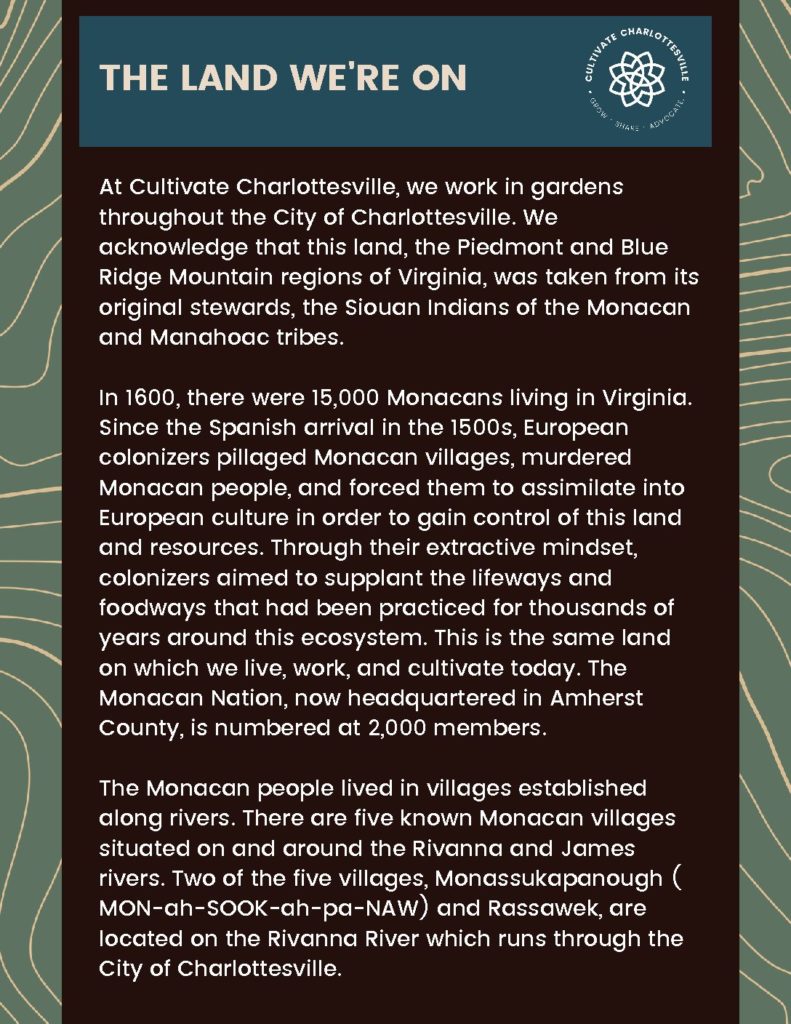
Each year the students grow hundreds of pounds of produce in the school garden. With the support of our mobile kitchens, CSG Garden Coordinators facilitate cooking activities where students harvest the food, clean, prepare and cook the food right in the garden. When the mobile kitchen isn’t in use, students are able to harvest and bag up the produce that they want to take home.
Starting in fall 2020, student-led focus groups and initiatives at CHS, Buford and Walker ensure that students are positioned to lead the conversation around what they want to see in their cafeteria. Cultivate Charlottesville facilitates these Student Nutrition Committee Meetings in collaboration with city school administrators. A five-year grant from the Charlottesville Area Community Foundation partners City Schoolyard Garden programs with Charlottesville City Schools Nutrition Department to increase fresh, from scratch, and healthy food options in our cafeterias, all led by student preference.
To celebrate Farm to School and Healthy Schools Week the first week in October, students experience a week-long menu of locally sourced food made from scratch. Cultivate Charlottesville coordinates with Charlottesville City Schools to connect students with local farmers through demonstrations, visits and taste-testing at their City Schoolyard Garden.
The Spring Seedling Project is a multi-faceted, youth-centered project that builds youth leadership and invests in neighborhood food security by engaging middle school students in planting, growing, and distributing seedlings to community organizations and Charlottesville City School (CCS) families and students.
Starting in February, hundreds of Buford Middle School students grow over 9,000 plants. Of those plants, 6,500 are distributed at no cost to schoolyard gardens, partner organizations, and students and their families including Urban Agriculture Collective Farms, IRC’s New Roots Program, Bread & Roses, City of Promise, Casa Alma, and Greenstone on 5th. The remaining 2,500 are distributed through the Spring Seedling Give-a-Way to the greater community.
Cultivate Charlottesville trains future leaders in food equity by mentoring Youth Food Justice Interns during summer months. For 8-weeks, interns spend 20 hours per week in the garden and in discussion groups learning about growing food, food access, food insecurity and food systems in Charlottesville.
Former interns have gone on to become active advocates in the food justice movement, through presentations to Charlottesville City Council, CCS school board, and the 2019’s Food System Conference in Savannah, GA. Former students have also joined the Cultivate Charlottesville staff, like Leon who you can read about on our staff page.
